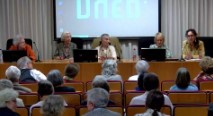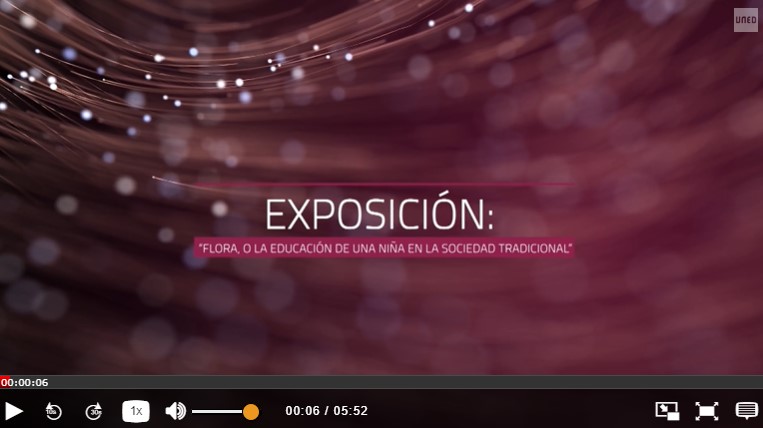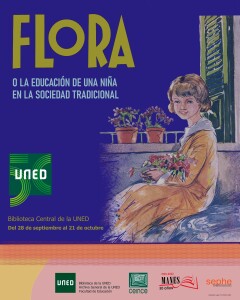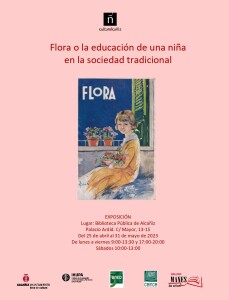Latest publications
Round Table “Women’s school memory under Franco”
Wednesday 28 September 2022, 12:00 pm
Faculty of Law. UNED
Coordinated by: Kira Mahamud Angulo, Lecturer in the Department of History of Education at UNED
PARTICIPANTS
Four women will take part in this round table sharing their school experiences in their schools for girls in the 60s and 70s of the last century.
Reyes Fernández Durán
She attended the Colegio del Sagrado Corazón de Rosales, in Madrid. In the summer her parents sent her to Switzerland and Ireland. She spent a year in London in a Teresian Residence learning English.
She holds a degree in Economics from the Complutense University of Madrid and a PhD in Economic Sciences.
She has held high positions in the administration and in public companies.
She has written the work Velo blanco, velo negro. La educación de las niñas de la burguesía en España en colegios religiosos (1950-1963), in which she recounts her memories as a pupil at the Colegio Sagrado Corazón in Sevilla and Madrid.
María Teresa Lavado Sánchez
She attended the Francisco de Vitoria Public School in Salamanca.
She holds a degree in Geography and History (Contemporary History Section) from the University of Salamanca.
Her professional activity was developed in the world of Libraries, in the Universities of León and UNED, in the latter as Expert of Archives, Libraries and Museums, being deputy director of the Library and coordinator of its cultural activities.
Pilar Alcalá Cortijo
Born in Madrid in 1946, she attended primary school at the Eijo Garay School Group and continued her high school studies at the Beatriz Galindo Institute, both in the Buenavista (now Salamanca) district of Madrid.
She holds a degree in Classical Philology.
After completing her degree, she obtained a post as Assistant Teacher of Spanish at a Grammar School, also for women, in London, as part of an exchange programme between Spain and the United Kingdom. She then went on to do postgraduate studies at the University of Florence. On her return she worked as an assistant lecturer at the Complutense University until 1978, when she joined the State Body of Archivists and Librarians, where she held various posts: Director of the Public Library of Cáceres, Director of Libraries at the Autonomous University of Madrid, Director of Libraries at the University of Alcalá, where she was also Director of the ICE until her retirement in 2011. During the period 1996-2000 she obtained by competition the post of Director of the Library of the European University Institute of Florence, an international and European Postgraduate institution.
Julia Sequí Navarro
She was born in Madrid in 1944, where she attended public nursery and primary schools in the city centre. In the 1953-54 and 1954-55 academic years, she studied at the primary school of the Isabel La Católica Institute, where she went on to study Secondary Education, the Pre-University Course and the University Entrance Examination.
She obtained a degree in Medicine and Surgery at the Faculty of Medicine of the University of Madrid, where she was Assistant Professor of Practical Classes in the chair of Biochemistry and Physiology. She undertook specialization and doctoral studies at the Immunology Department of the Clínica de la Concepción in Madrid, where she qualified as a Medical Specialist in Immunology, obtaining her Doctorate in Medicine in 1975.
She was an Assistant Doctor in the Laboratory of the Silicosis Hospital in Oviedo and in the Immunology Service of the Ramón y Cajal Hospital in Madrid. Subsequently, she was Head of the Immunology Section at the Carlos III Hospital, dependent on the Carlos III Health Institute. She has been Vice-President of the Spanish Society of Immunology and of the Society of Immunology of the Autonomous Community of Madrid.
Exhibition “FLORA, or the education of a girl in traditional society”
Central Library of UNED, from 28 September to 21 October 2022
This exhibition was an initiative of the MANES Research Centre and the International Centre for School Culture (CEINCE) of Berlanga de Duero (Soria), to commemorate the 50th anniversary of the foundation of UNED and the 30th anniversary of the creation of the MANES Centre. The Cultural Activities Commission of the Library and the General Archive of the UNED, as well as the Faculty of Education, are collaborating in the organisation.
The exhibition explores and promotes a portrayal of the education of women in traditional society, an image based on differentiation and exclusion, categories and values that dominated the education of women in the 19th century and the first half of the 20th century. Textbooks and school material in which the education of women in the past has been reflected were displayed, with the aim of contrasting the experiences of the past with the expectations of inclusion that the new gender relations postulate.
The material on display comes from the MANES Fund of UNED Library, the MANES Historical Fund kept in the General Archive of UNED, and the CEINCE.
The exhibition was inaugurated on 28 September 2022, at 11:00 a.m., in the UNED Library (Paseo Senda del Rey, 5), followed by a round table on the theme “School memory of women in Franco’s regime“. Four women took part in this round table, which was held at 12:00 p.m. in the Faculty of Law of UNED, sharing their experiences in their schools for girls in the 60s and 70s of the last century.
Download the invitation
Download the exhibition brochure
News: The Education of the past, through its manuals
This exhibition was also adapted to the display space of the Public Library of Alcañiz (Teruel) , with materials from the collections of the Public Library and the Municipal Archive of Alcañiz, as well as from several private collections and schools in the Lower Aragon region.
To access the virtual exhibition click here.








